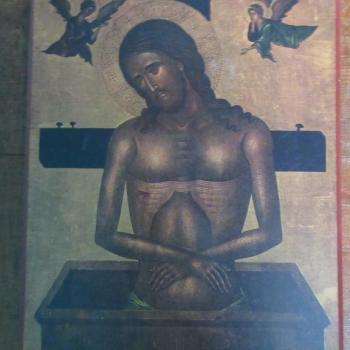I have not blogged for a while. My heart is not really in it. My mother’s death two weeks ago has something to do with it. But this is only part of the reason. As I watch the revelations that seem to come out each day about the Church with a mixture of horror and fascination, I find my pen runs dry. Frankly, I do not know what to write because I do not know what to think. I have rarely been more conflicted.
On one hand, I align myself with Michael Sean Winters and Austen Ivereigh. The media frenzy is partly driven by dark undertones of anti-Catholicism, a stream that runs especially deep in the American and British consciousness. Why is the Catholic Church being singled out while other entities have worse records on child abuse? Why is the pope singled out when he has done more than most clerics to face up to the horrors of child abuse by religious? I can no longer read the frantic denunciations of people like Andrew Sullivan, who have adopted the mob rhetoric of the tea-partiers. I am disgusted.
But this reaction is not satisfactory. It is not the answer. As archbishop Diarmiud Martin said during his easter vigil homily, we should not give into the temptation to simply lash out at the media. We are seeing too much of that, both in the United States and in Rome, and it has echoes of Bernard Law’s crusade against the Boston Globe. That worked out well, didn’t it? As Martin said: “The sins of the Church can well be exposed by the spotlight of the media; but the Church will be converted, renewed and reformed only when it allows the light of Christ to inspire it and guide it”.
I fear that too many Catholics today, including among the episcopacy, are not fulling letting the light of Christ guide them. Tempting as it might be, the Christian response is not to simply lash out at the media. It is to unite itself with the suffering Christ, taking the slings and arrows thrown at it. It is to unite itself with the victims of abuse, not the Church leaders who may or may not have behaved dishonorably in covering up the abuse in the past. It is the rediscover the truth from Lumen Gentium, that sees the Church not just as a hierarchical institution but as the people of God, a humble and pilgrim Church rather than a smug and triumphalist entity.
I fear the Church still has a long way to go to reach that vision. I did not always think so, and I took a far more optimistic view of our Church leaders until relatively recently. I feel a darkening cloud hovering over the Church. But, as always with the Church, we need to think long term. A wise man once said that it took centuries for the reforms of Trent to filter through, and it would take just as long before the vision of the Second Vatican Council came to fruition.
But we need to focus on these problems today. Just consider the recent expose about Maciel and his Legionnaires of Christ – for me, this is the real story, not what Ratzinger did or did not do a quarter century ago. If you have not done so already, read the two-part tale told by Jason Berry (here and here). I am still reeling from this revelation. You will feel nauseous. Maciel displays all the characteristics of an unrepentent sociopath. He was a corrupt liar, a morphine addict who ruled his cult in an atmosphere of fear, an abuser and a child rapist, a man who fathered children from numerous women and brazenly took them to meet John Paul II, a man who never showed any remorse for his actions.
People were on to him as early as the 1950s. But he was never stopped, and he was a favorite of the Vatican, especially under the last pope. Why? Because Maciel bribed everybody he could with wads of cash. To his great credit, Cardinal Ratzinger refused to touch any of this blood money, and was over-ruled in his attempts to investigate Maciel. Many other senior Vatican officials were not as scrupulous, including Cardinal Sodano, a leading defender of both Maciel and Pinochet (picks his friends well, doesn’t he?).
Of course, corruption in the Church is nothing new, and this is small scale compared with the past. But this is not really the point. The Maciel scandal shines the light on why the Church needs to be constantly renewed and reformed. The clericalism that fed the abuse crisis in the first place is alive and well, especially at the top of the Church. Remember, Maciel’s behavior was observed as far back as the 1950s, and much of the information was in the public domain by the mid-1990s. But the institutional Church turned a blind eye, and in doing so, betrayed the victims of Maciel, and (since we are one people), the victims of abuse everywhere.
I hope and pray that Pope Benedict has the fortitude needed to address these challenges. He has shown a greater sensitivity than many of his peers in the past, and I hope he does so again. But these are deep-rooted structural problems. I believe that these issues will weigh heavily on the minds of the electors during the next conclave. I believe the next pope will be tasked to fully implement the vision of Lumen Gentium. That vision includes a role for us – lay Catholics. The document notes that we are “permitted and sometimes even obliged to express their opinion on those things which concern the good of the Church.” I, for one, can think of no bigger issue concerning the good of the Church at this particular moment.












